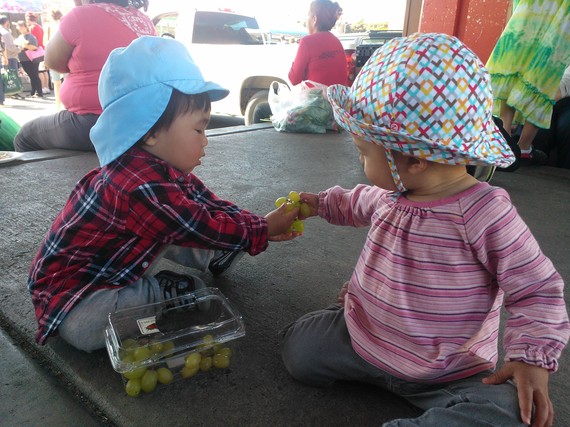A friend and I were sitting on the floor with our 18-month-olds as they played with a kids' construction set, and you can guess what happened next. My kid tried to bogart the hammer from her playmate, and her playmate declined to hand it over. My friend said, "No, no, we need to share." She tried to take the toy out of her daughter's hand; her daughter held on tighter. "Can you share?" my friend pleaded, blood pressure on the rise.
I was in the middle of writing Zero to Five: 70 Essential Parenting Tips Based on Science, and I'd just read about this study that I found fascinating.
Everyone says that 18-month-olds are no good at sharing. The researchers wanted to know: What kind of information does a child need to be able to help someone else? Does that change if "helping" means the child has to sacrifice a belonging of his own?
In the study, an adult pretended to be cold. A blanket was within reach of the child, who was either 18 months old or 30 months old. The adult went through progressively more explicit cues, five to seven seconds each, until the child brought over the blanket.
- Gestures: Shivering, rubbing and hugging oneself, saying "Brrr."
- Naming the internal state: "I'm cold."
- Stating a general need for an object: "I need something to make me warm."
- Labeling the object needed: "A blanket!"
- Nonverbal request: Looking at the child, then the blanket, then the child.
- Less subtle nonverbal request: Gesturing to the blanket.
- General verbal request: "Can you help me?"
- Specific verbal request: "Can you bring me the blanket?"
Guess at which point the average 18-month-old figured it out. Step 6.
But by 30 months old? Step 2. Unless it was the child's own blanket that the child had to share. Then, the 30-month-old resisted until Step 4.
The experiment highlights the difference between empathic helping (I can see you need help, so I'll help you) and altruistic helping (I'll help you even though it requires sacrifice on my part). The latter simply takes longer to develop.
So we can see why, in the middle of an even more emotional situation like a tug-of-war over a toy, it's pretty tough for a toddler to act altruistically.
I take two things from this study when it comes to toy grabs.
Wait and see
The first is that hanging back for couple minutes, and seeing if the kids will work things out on their own, gives the kids practice at reading others' cues and climbing up this developmental ladder. It helps to agree on this course of action with the other parent first. You might even try timing yourself so that you don't jump in just because you're afraid of being judged by the other parent.
Be direct
Second, when we parents step in with "We need to share," the request is too general for a toddler to grasp. We're somewhere around Step 1. We have a better chance of getting our point across if we jump to Step 8 and provide explicit instructions:
"Your friend would like a turn. Can you hand the toy to your friend?"
I shared this study with my friend as we sat on the floor with our 18-month-olds. She turned to her daughter and said, "Your friend would like a turn. Can you hand the toy to your friend?" And her daughter did -- happily. She even seemed proud of herself. My friend and I looked at each other and went, "Whoa!"
There's no way this will work every time. But a year later I still find the concept useful, with some added explanation or negotiation. "You may play with the toy for two more minutes. Then it will be your friend's turn." Or "Please hand the toy back. We don't grab toys. You can say, 'May I have a turn?' But if your friend says no, you'll need to wait."
Being direct doesn't always prevent tantrums. But it helps you teach the lesson you intended. For one thing, you avoid prying the toy from your child's hand -- the very thing you didn't want her to do.
